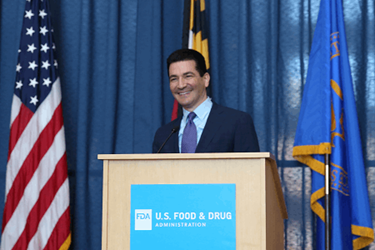What Can Scott Gottlieb Do To Advance The FDA & Clinical Trials?

On May 11, Scott Gottlieb, M.D., officially became the 23rd commissioner of the U.S. Food and Drug Administration (FDA). Dr. Gottlieb has previous FDA experience, having served as deputy commissioner for medical and scientific affairs, among other positions, during the George W. Bush administration. More recently, he was a venture partner at the world’s largest venture capitalist firm, New Enterprise Associates (NEA), sitting on the boards of several pharmaceutical companies, including GSK, Daiichi Sankyo, and Vertex. He was also a clinical assistant professor and practiced medicine at the New York University (NYU) School of Medicine, and is a cancer survivor (Hodgkin’s lymphoma).
For perspective on what Dr. Gottlieb’s appointment means for the FDA, the pharmaceutical industry, and the clinical trials enterprise specifically, Clinical Leader reached out to David Rosen, co-chair of the life science practice at Foley & Lardner — and a 14-year veteran of the FDA.
What do you know about Scott Gottlieb’s background, and do you feel he will be a good addition to the FDA?
 David Rosen: He’s a physician, he’s been active in drug development, he’s been involved in the investment activity surrounding pharmaceutical companies, and he has a strong track record with the FDA. Each of those qualifications will contribute to a better understanding and appreciation of the issues that arise in the development of products.
David Rosen: He’s a physician, he’s been active in drug development, he’s been involved in the investment activity surrounding pharmaceutical companies, and he has a strong track record with the FDA. Each of those qualifications will contribute to a better understanding and appreciation of the issues that arise in the development of products.
He will bring fresh insights to the regulatory process and has already displayed a creative approach to addressing the issues confronting the FDA. And, while the FDA doesn’t necessarily deal with pricing, he is looking to address the review and approval process for generics.
He’s also working on restricted distribution schemes and systems to allow generic companies to gain access to those products in order to conduct appropriate product studies. These are complex products that present unique bio-study issues.
Overall, his proactivity and energy are great for the FDA as it works to advance and protect public health and safety.
Any insights into his perspectives on the clinical trials process?
Rosen: Dr. Gottlieb is seeking to speed up the clinical trials process — that’s really important to him. He’s carefully evaluating whether there are alternative ways to strike a balance between efficacy, safety, and risk and benefits of certain drug products.
Dr. Gottlieb has also emphasized the importance of new tools, including the use computer simulation and modeling throughout the pharmaceutical and medical device development process to help improve and accelerate access to new technologies. By using such innovative tools, FDA staff can more efficiently and effectively evaluate complex data sets.
The last thing Dr. Gottlieb wants to do is to grant quicker approvals at the expense of patient safety — it’s a tough balance. But he’s working with agency staff and looking at new and innovative ways to evaluate drugs and devices. He wants to make sure that we have the appropriate measures in place to get the necessary data and intelligence to assure that products meet the standards for approval, while at the same time not being overly burdensome in terms of the requirements.
Additionally, companion diagnostics and study designs are big issues regarding how people will respond to drugs and therapies. This will be on Dr. Gottlieb’s and the FDA’s radar as well.
Does he have education/experience that you think will make him an asset to the FDA?
Rosen: Absolutely. He has the background, credentials, and qualities to be a very valuable asset to the FDA. He has the medical pedigree and understands patients and how they are impacted by products in the marketplace. He has experience working at the FDA — and with the FDA as a member of industry — so he understands that things can’t change overnight. While he has a lot on his agenda, he knows he must maintain the balance between process expediency and safety. His primary focus is making sure the American public trusts the process.
Are there any changes you would like to see made to the clinical trials process under his tenure?
Rosen: I’d like to see increased yet less formal interactions between the FDA and industry participants. It’s become very institutionalized, as a lot of things have to be in writing with an evaluation. Take the Prescription Drug User Fee Act time frames, for example. People are very concerned about meeting those time frames, but having some more communication with applicants during the review process might help facilitate the FDA’s responses to questions in real time.
Should his appointment be seen as good news for pharma, CROs, or patients?
Rosen: I think we’re seeing his appointment as good news for pharma, CROs, and patients. He’s taking on initiatives that will ensure we get the right products to market at the right time. He’s looking to eliminate unnecessary bottlenecks, and trying to address those situations in a very creative and positive manner.
In the generic drug arena, more access and availability will certainly benefit patients. The same can be said about biosimilars, where he’s working to remove barriers that could stall drug development.
We’ve also seen him take decisive action against the opioid epidemic. This is a burgeoning issue for the country, where he’s been outspoken.
If you had the opportunity to speak with Dr. Gottlieb, what advice would you give him with regard to helping companies lessen the time and cost of trials?
Rosen: I would advise Dr. Gottlieb to get to know staff at all levels of the organization. While he’s at the highest level, it would behoove him to try to understand some of the decisions that are made at the review division levels, too. I think he could really benefit from going to a few meetings where the division talks about those issues, especially surrounding the products that are new and where there are no treatment alternatives.
He should also recruit talented people of the highest caliber and with diverse backgrounds. This will make those review teams more dynamic, which will lead to smarter and collaborative decisions concerning the development of products.
Scott Gottlieb photo credit: U.S. Food and Drug Administration
